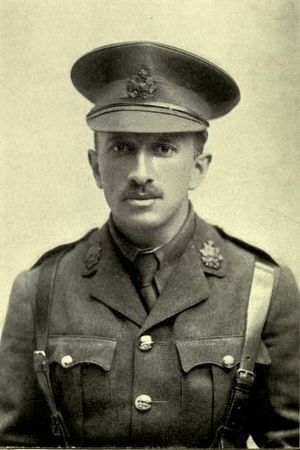Bernard Pitt facts for kids
Quick facts for kids
Bernard Pitt
|
|
|---|---|

Pitt in army uniform
|
|
| Born | 19 June 1882 |
| Died | 30 April 1916 (aged 33) near Arras, France |
| Service/ |
British Army |
| Years of service | 1915–1916 |
| Rank | Second lieutenant |
| Unit | Border Regiment and 47th Trench Mortar Battery |
| Battles/wars | First World War |
| Awards | Mention in despatches |
| Memorials | Arras Memorial |
| Alma mater | Borough Road College |
| Spouse(s) | Florence Mary |
| Children | 4 |
Bernard Pitt (born June 19, 1882 – died April 30, 1916) was a British teacher, soldier, and poet. He was known for his writings during the First World War. Pitt studied at Borough Road College to become a teacher. He later taught English literature at the Working Men's College in London.
In 1914, Pitt started studying old English literature. However, he stopped his studies to join the British Army. He wanted to fight in the First World War. Pitt served as an officer in the Border Regiment. He was later part of the 47th Trench Mortar Battery in France. He was killed in action while directing his battery's fire near Arras. After his death, a book of his letters and poems from the war was published.
Contents
Who Was Bernard Pitt?
Bernard Pitt was born on June 19, 1882. His parents were Abraham Robert Pitt and Annie. He went to Borough Road College from 1901 to 1903. This college trained people to become teachers. Pitt did well in subjects like chemistry and agriculture.
After getting his teaching certificate, Pitt stayed at the college. He earned a degree in languages. In 1911, he received a master's degree in literature. Both of these degrees were from the University of London. Bernard Pitt married Florence Mary, and they had four children together.
Pitt's Teaching Career
Pitt became a teacher at several schools. He taught at the King's School in Kew. He also taught at Sir Joseph Williamson's Mathematical School in Rochester, Kent. Later, he taught at Coopers' Company School in Bow, London.
From 1912, Pitt also taught English literature. He taught at the Working Men's College in St Pancras, London. His classes there were for students studying for a university degree. A historian named Arthur Smith praised Pitt's students' essays. He said they were as good as work done at the University of Oxford.
In late 1914 and early 1915, Pitt worked on a project. He was reviewing Anglo-Saxon literature with Alfred J. Wyatt. But before they finished, Pitt decided to join the army. He felt that nothing else mattered compared to the war. Alfred Wyatt finished their work, and it was published in 1919.
Bernard Pitt in World War I
Pitt first joined the Volunteer Training Corps. This was a group of volunteers who helped during the war. Later, he joined the main British Army. He became a second lieutenant in the Border Regiment on April 1, 1915. He served with the 10th (Reserve) Battalion. This battalion was part of Kitchener's Army.
Pitt was sent to France in December 1915. He first served near Béthune. He saw a lot of intense fighting there. He was even suggested for a special award called the Military Cross. Instead, he received a mention in despatches. This was a lower but still important honor.
Serving with Trench Mortars
From February 1916, Pitt was assigned to the 47th Trench Mortar Battery. He was killed in action on April 30, 1916. This happened near Arras. Pitt was watching where his battery's shells were landing. He was helping to make sure their aim was correct. A German mine exploded under his position. He was killed in the explosion, and his body could not be found.
Pitt's brigadier-general spoke highly of him. He said Pitt was full of courage and spirit. The general noted that when the Germans seemed annoyed, the soldiers would say, "oh, it's that little trench mortar officer at them with his guns." At the time of his death, Pitt was about to be promoted to a staff officer.
Bernard Pitt is remembered on the Arras Memorial in France. The Working Men's College, where he taught, also named a room after him.
Pitt's War Writings
During his time on the front lines, Pitt wrote many letters and poems. These were collected and published after he died. His letters showed different feelings about the war. Sometimes they were hopeful, like the poems of Rupert Brooke. Other times, they showed sadness and anger about the war, similar to the writings of Siegfried Sassoon.
Just two days before he died, Pitt had a 24-hour break. He wrote home while sitting under a walnut tree near a ruined village. He wrote about the beauty of the blossoming fruit trees, flowers, and wildlife around him.
 | Kyle Baker |
 | Joseph Yoakum |
 | Laura Wheeler Waring |
 | Henry Ossawa Tanner |

